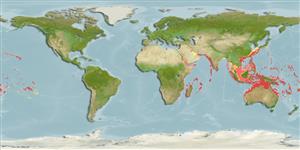Environment: milieu / climate zone / depth range / distribution range
Ecologie
marien rifbewoner; diepte 0 - 180 m (Ref. 89972). Tropical; 26°C - 29°C (Ref. 27115); 35°N - 33°S, 30°E - 128°W
Indo-Pacific: Red Sea and East Africa (Ref. 3145) to the Hawaiian, Marquesas and Tuamoto islands, north to southern Japan, south to Lord Howe and Rapa islands. Presence in Somalia to be confirmed (Ref. 30573).
Grootte / Gewicht / Leeftijd
Maturity: Lm ? range ? - ? cm
Max length : 70.0 cm FL mannelijk / geslacht onbekend; (Ref. 9710); common length : 50.0 cm TL mannelijk / geslacht onbekend; (Ref. 3146); max. gerapporteerde leeftijd: 55 Jaren (Ref. 118238)
Dorsale stekels (totaal): 6; Dorsale zachte stralen (totaal): 27-30; Anale stekels 2; Anale zachte stralen: 27 - 30. This species is characterized by the following: body depth vary from about 2.0 in SL (in subadults) to 2.4-2.6 (adults) in SL; with a tapering, bony, horn on forehead of adults projecting anteriorly at level of eye but not extending in front of mouth (horn first as a bump on forehead at a length of about 12 cm); dorsal profile from snout to horn straight, angle of about 45°; 2 peduncular plates with well-developed forward-curving knife-like spines; emarginate caudal fin when young, truncate with filamentous lobes in adult; males apparently with longer horn, larger peduncular keels and longer caudal filaments than females of the same size; body yellowish to olivaceous gray dorsally, paler ventrally, with blue peduncular plates and keel spines; lips whitish or blue; blue area is sometimes present around pectoral fin; dorsal and anal fins yellowish with narrow blue margins; caudal fin orangish basally, shading to gray, with a broad, pale greenish posterior border and caudal filaments are edged in blue; one transient color phase is a blotchy pale greenish zone below the spinous portion of dorsal fin that narrows and ends beneath the pectoral fin (Ref. 27362).
Adults inhabit channels, moats, lagoon and seaward reefs with strong surge (Ref. 48637). Benthopelagic (Ref. 58302). Typically occurring in small groups. Sometimes solitary (Ref. 90102). Juveniles in shallow protected bays and harbours (Ref. 48637). Mainly diurnal, feed on coarse leafy brown algae like Sargassum. Pair-spawning has been observed. Minimum depth reported taken from Ref. 128797.
Levenscyclus en paargedrag
Maturiteit | Voortplanting | Paaien | Eieren | Fecunditeit | Larven
Spawn in pairs (Ref. 240).
Myers, R.F., 1991. Micronesian reef fishes. Second Ed. Coral Graphics, Barrigada, Guam. 298 p. (Ref. 1602)
Status op de Rode Lijst van het IUCN (Ref. 130435)
Gevaar voor de mens
Reports of ciguatera poisoning (Ref. 4795)
Gebruik door de mens
Visserij: commercieel; sportvis: ja; Aquarium: Commercieel
Meer informatie
ReferentiesAquacultuurAquacultuurprofielKweeklijnenGeneticaElectrophoresesErfelijkheidZiektesVerwerkingNutrientsMassaconversie
Tools
Speciale rapporten
Download XML
Internetbronnen
Estimates based on models
Preferred temperature (Ref.
123201): 23.4 - 28.8, mean 27.4 °C (based on 1536 cells).
Fylogenetische diversiteitsindex (Ref.
82804): PD
50 = 0.5000 [Uniqueness, from 0.5 = low to 2.0 = high].
Bayesian length-weight: a=0.02344 (0.01735 - 0.03168), b=2.95 (2.86 - 3.04), in cm total length, based on LWR estimates for this species (Ref.
93245).
Trofisch niveau (Ref.
69278): 2.2 ±0.11 se; based on food items.
Weerstandsvermogen (Ref.
120179): laag, minimale populatieverdubbelingstijd 4,5-14 jaar (K=0.14).
Prior r = 0.28, 95% CL = 0.16 - 0.49, Based on 3 stock assessments.
Fishing Vulnerability (Ref.
59153): Low to moderate vulnerability (32 of 100).
Climate Vulnerability (Ref.
125649): Very high vulnerability (80 of 100).
Nutrients (Ref.
124155): Calcium = 33.3 [16.8, 58.2] mg/100g; Iron = 0.554 [0.285, 1.039] mg/100g; Protein = 18.4 [17.1, 19.7] %; Omega3 = 0.109 [0.065, 0.196] g/100g; Selenium = 58.8 [29.8, 118.5] μg/100g; VitaminA = 21.5 [5.0, 90.1] μg/100g; Zinc = 1.03 [0.66, 1.54] mg/100g (wet weight);
